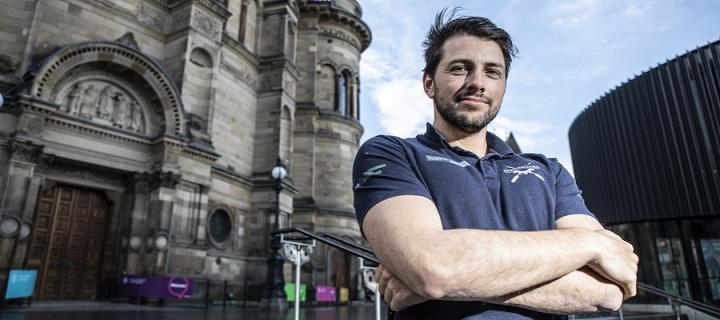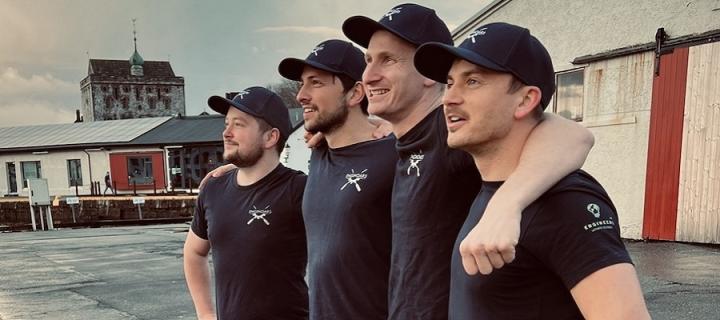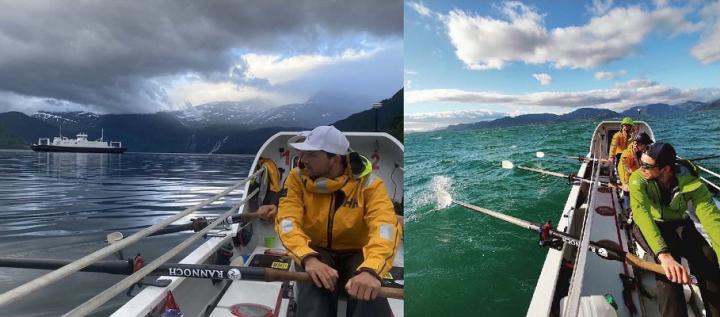Rowing the Atlantic (article by Charlotte Stapley for the Bulletin magazine)
This December, Rufus Mitchell-Heggs, a Computational Neuroscience PhD student in the Centre for Discovery Brain Sciences, is taking part in the world’s toughest row to raise money for charity.

Christmas at sea
While many of us will be winding down for the holidays, Rufus will be in a rowing boat in the middle of the Atlantic Ocean. “The Talisker Whisky Atlantic Challenge is an annual rowing race,” explains Rufus. “It starts in La Gomera, Canary Islands and finishes 3,000 miles across the Atlantic in Nelson’s Harbour, Antigua.”
He’s taking place in the annual row with three other teammates. The race will take around 40 days to complete, spanning the month of December and beyond. Teams will follow a gruelling schedule of rowing for two hours on, two hours off to make up a rough total of 1.5 million oar strokes.
“More than 30 teams attempt the crossing each year and do so completely unsupported. That includes carrying all the equipment and supplies necessary to survive and safely make the crossing,” he explains.
For Rufus’ team, the Enginoars, that means carrying safety equipment such as medical kits, a life raft and more than one million calories of food for the entire team.
“Over the course of the journey we must prepare to endure seasickness, exhaustion, hallucinations and all manner of events that can go wrong,” Rufus adds.
Chasing adventure
Rufus is a PhD student at both the University of Edinburgh and Imperial College. He shares a bit more about his work: “From the start, my PhD has been a collaboration between Imperial College and the University of Edinburgh. During the past four years I have split my time between two neuroscience lab groups – learning methods of neural analysis with Imperial College and applying them to questions of memory and social cognition at Edinburgh.”
Rufus’ teammates are Simen, an Aerospace Engineer at Clara Venture labs, Sindre, a Software Engineer for the IT consultancy Alv As, and Thor, a Marine Engineer working onboard the Norwegian Tall ship, the Stastraad Lehmkul.
Originally though, the Enginoars first met in Toulouse, France. “Three of us were working and studying and one was visiting. What started as a friendship revolving around the words ‘Cheers’ and ‘Skøl’ quickly transcended into hiking and sporting adventures,” Rufus continues.
“During these trips, we learnt of our common passion for adventure, our appreciation for nature and our resilience in dealing with difficult situations.”
So why did the team decide to get involved in a challenge this tough? For Rufus, it’s simple: “Adventure – the opportunity to explore the ever-changing ocean environment and to experience how our minds come together as a team to overcome challenges.”

Engineers without Borders
The team has chosen Engineers without Borders as their charity. The initiative looks to drive global and responsible engineering projects. Rufus shares more: “In taking on such a monumental challenge, we wanted to partner it with an equally important cause. For the Enginoars, nothing is greater or more important than securing the future of our planet through projects in global sustainability.
“Not only do they embody our passion for improving sustainability, but they achieve it in a realistic way that leverages the engineering problem solving mindset.”
But for Rufus there’s also a more personal reason: “As a neuroscientist and bioengineer building a career dedicated to improving healthcare, I am aware of my lack of contribution in helping solve this global problem. As a co-founder of the Enginoars, I aim to change that by doing what I can to raise awareness and funds that can empower those that have dedicated their lives to this cause.”

Building mental resilience
For the past year the Enginoars have been juggling work, life and training, to make sure they’re as prepared as possible for the race. Rufus explains what that has looked like: “For three months the team trained in the Norwegian fjords covering more than 800 kilometres on the boat and learning how to live on it. This has enabled us to refine technique, routines and practise safety drills.
“Now in the final build up to the start line we are focused on maximising our time in the gym, refining our bodies, ironing out injuries and most importantly building mental resilience.”
With the starting date of the 40-day journey inching closer, Rufus is all too aware of the challenge that the Enginoars face: “We will certainly be keeping our eyes on the 30-metre waves, avoiding capsizes, injury and most importantly jeopardising our friendship.
“That being said, the things you dread happening often make the adventure. No day, no two-hour shift will be the same. The environment, the weather and our mindsets will constantly be changing. It is up to us to conquer them as friends and as a team. I’m excited to learn how we adapt to this new way of life for 40 days.”
Follow the journey
You can find the team and keep up with their progress by searching @enginoars on all social media platforms. They will also be sharing details of how you can follow the full crossing using the YB races app.
Photography: Sam Sills

